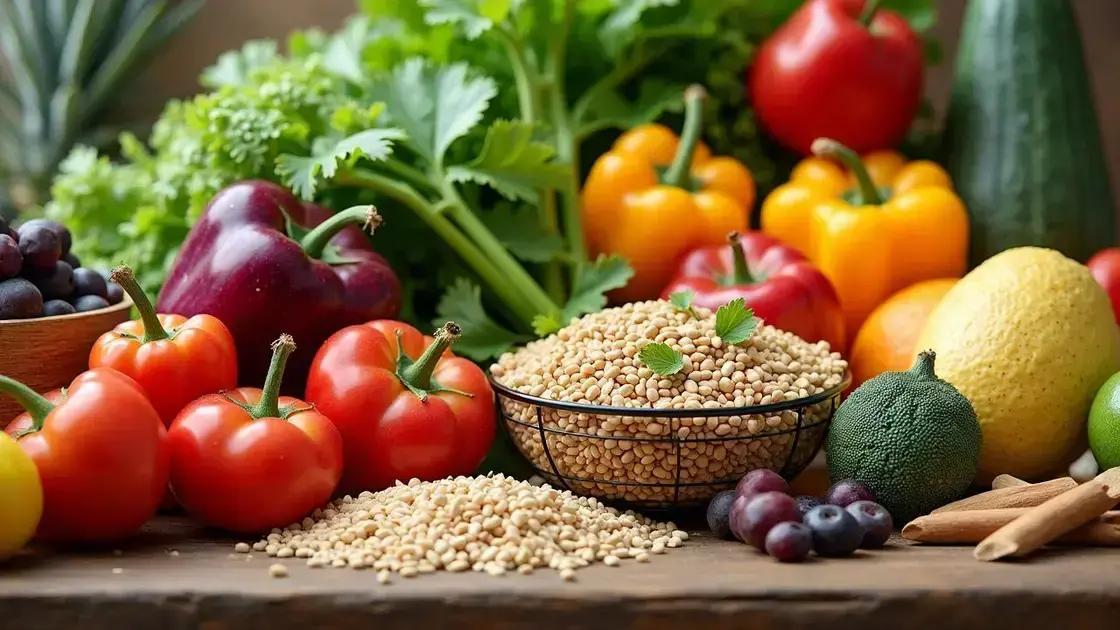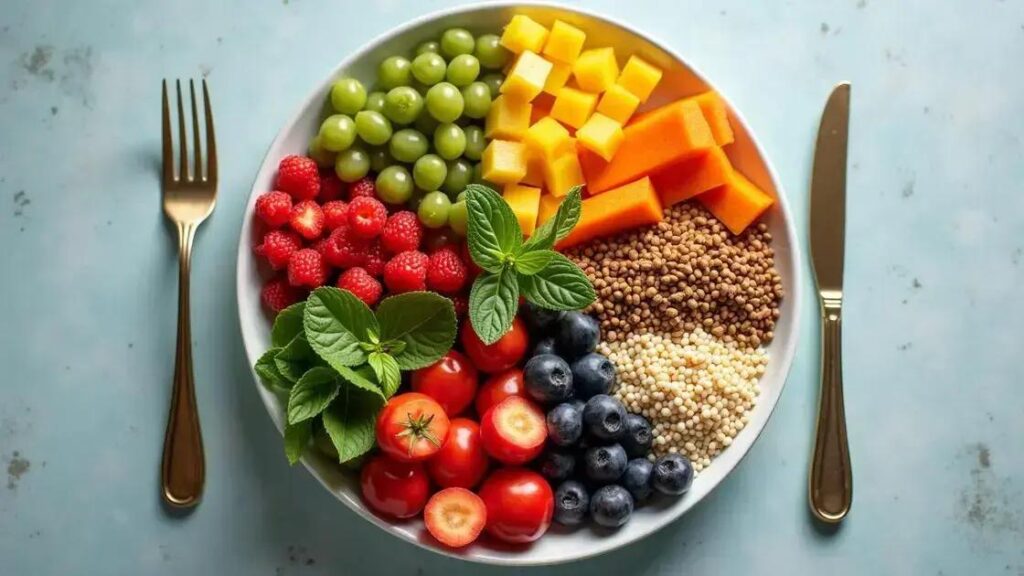The benefits of switching to whole food alternatives include improved nutrition, better digestion, heart health, and weight management. By gradually transitioning to whole foods like fruits, vegetables, whole grains, and nuts, you can enhance your overall health while enjoying delicious recipes and meal options.
Switching to whole food alternatives is not just a trend; it’s a lifestyle change that brings numerous health benefits. By incorporating fresh, unprocessed foods into your diet, you can improve your overall well-being, support better digestion, and ensure your body gets the nutrients it needs. This article will explore what whole food alternatives are, their nutritional advantages, tips for transitioning, and some delicious recipes to try. Get ready to discover how making this switch can transform your health!
What are Whole Food Alternatives?

Whole food alternatives are foods that are minimally processed and free from artificial ingredients. They include items that are as close to their natural state as possible, such as fruits, vegetables, whole grains, nuts, and seeds. Unlike processed foods that contain additives and preservatives, whole food alternatives focus on nutrition and flavor.
When you switch to whole food alternatives, you consume ingredients that provide more nutrients and antioxidants. These foods are not only healthier but also more flavorful, making meals more enjoyable.
Examples of Whole Food Alternatives
Some great examples of whole food alternatives are:
- Brown rice instead of white rice.
- Quinoa as an alternative to pasta.
- Fresh fruits and vegetables instead of canned or frozen versions.
- Nuts and seeds instead of sugary snacks.
Whole food alternatives also include dairy substitutes like almond milk or coconut yogurt, which offer similar textures with fewer additives. Making these swaps can greatly enhance your diet.
By incorporating whole food alternatives, you can enjoy a variety of tastes and textures while also supporting your health. The foods you choose can help improve your overall energy levels and decrease the risk of chronic diseases.
Nutrition Benefits of Whole Foods

Whole foods provide numerous nutrition benefits that can significantly enhance your health. These foods are rich in essential nutrients, which support various bodily functions. Here are some of the main benefits of incorporating whole foods into your diet:
Rich in Nutrients
Whole foods are packed with vitamins, minerals, and antioxidants. These nutrients help boost your immune system and protect your body from diseases. For example, fruits and vegetables are high in vitamins A and C, which are known for their immune-boosting properties.
Better Digestion
Whole foods often contain more fiber compared to processed foods. Fiber is crucial for good digestion as it helps regulate bowel movements and prevents constipation. Foods like whole grains, legumes, fruits, and vegetables are excellent sources of fiber.
Heart Health
Eating whole foods can lower your risk of heart disease. Whole grains, nuts, and seeds are known to reduce bad cholesterol levels. They are heart-healthy and contribute to better blood sugar control. This can be particularly beneficial for managing weight and preventing diabetes.
Weight Management
Whole foods usually have fewer calories and more nutrients than processed foods. Eating these foods helps you feel full longer, which can prevent overeating. Natural sugars found in fruits provide you with energy without the added calories and chemicals found in snacks and desserts.
In addition to these benefits, whole foods can also improve mental clarity and mood. By choosing nutritious options, you support both your physical and mental well-being. This makes a significant difference in your quality of life.
How to Transition to Whole Foods

Transitioning to whole foods can seem intimidating, but it doesn’t have to be hard. Here are some simple tips to help you make the switch smoothly.
Start Slowly
Begin by gradually replacing processed foods in your diet with whole foods. For example, if you typically eat white bread, try switching to whole grain bread first. This approach makes it easier to adjust your taste buds.
Plan Your Meals
Meal planning is key to making this transition easier. Take some time each week to plan your meals using whole food ingredients. This helps avoid the temptation of fast food and ensures you have healthy options ready.
Shop Smart
When grocery shopping, focus on the perimeter of the store. This is where fresh produce, meats, and dairy products are often located. Try to avoid the inner aisles filled with highly processed foods.
Get Creative in the Kitchen
Cooking at home allows you to experiment with whole foods. Use different recipes that highlight fruits, vegetables, whole grains, and healthy fats. Try to cook with ingredients you’ve never used before to discover new flavors.
Keep snacks on hand to avoid cravings. Nuts, fruits, and yogurt are nutritious snacks that can help you stay on track. Remember, it’s okay to indulge occasionally but aim for mostly whole food choices.
As you transition, be patient with yourself. Changing your eating habits takes time, but the health benefits are worth it.
Delicious Whole Food Recipes to Try

Eating whole foods can be delicious and satisfying. Here are some tasty whole food recipes you can try at home:
1. Quinoa and Black Bean Salad
This refreshing salad is packed with protein and flavor. Combine cooked quinoa, black beans, diced tomatoes, corn, chopped bell peppers, and cilantro. Dress with lime juice, olive oil, salt, and pepper. Chill before serving.
2. Vegetable Stir-Fry
This quick dish can be made with any vegetables you have on hand. Sauté a mix of broccoli, bell peppers, carrots, and snap peas in olive oil. Add soy sauce, ginger, and garlic for seasoning. Serve over brown rice or quinoa.
3. Overnight Oats
Start your day with healthy overnight oats. Mix rolled oats, almond milk, chia seeds, and honey in a jar. Let it sit in the fridge overnight. In the morning, top with fresh fruits and nuts.
4. Sweet Potato and Chickpea Curry
This hearty curry is perfect for warming up on a chilly day. Cook diced sweet potatoes, chickpeas, and spinach in coconut milk and curry powder. Serve it with brown rice or whole grain naan.
5. Fruit and Nut Energy Bites
For a quick snack, blend dates, nuts, and coconut in a food processor. Roll the mixture into bite-sized balls and refrigerate. These energy bites are great for a boost before or after workouts.
These recipes are not only healthy but also simple to prepare. They can help you enjoy the benefits of whole foods without sacrificing flavor.
Embracing Whole Food Alternatives for a Healthier Future
Switching to whole food alternatives is a rewarding journey that can transform your health and well-being. By understanding what whole foods are and their nutrition benefits, you can make informed choices about what you eat.
Transitioning to whole foods doesn’t have to happen overnight. By slowly incorporating more whole foods into your diet, planning your meals, and trying delicious recipes, you can develop healthier eating habits that are enjoyable and sustainable.
As you explore these changes, remember that every small step counts toward better health. Embrace the vibrant flavors and nutritional benefits of whole foods, and you may find a renewed sense of energy and vitality in your everyday life.
FAQ – Frequently Asked Questions about Whole Food Alternatives
What are whole food alternatives?
Whole food alternatives are minimally processed foods that are close to their natural state, such as fruits, vegetables, whole grains, nuts, and seeds.
What are the nutrition benefits of whole foods?
Whole foods are rich in vitamins, minerals, and antioxidants, which can improve your immune system, promote better digestion, and support heart health.
How can I start transitioning to whole foods?
Begin slowly by replacing processed foods with whole foods, plan your meals, and experiment with cooking to make the transition enjoyable.
Can you recommend some whole food recipes?
Sure! Some great recipes include quinoa and black bean salad, vegetable stir-fry, overnight oats, sweet potato and chickpea curry, and fruit and nut energy bites.
Are whole foods good for weight management?
Yes, whole foods are often lower in calories and high in nutrients, making them helpful for weight management as they keep you full longer.
How does cooking at home help with eating whole foods?
Cooking at home allows you to control the ingredients and explore various whole food options while avoiding the additives found in processed foods.













